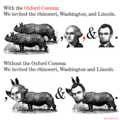Difference between revisions of "Category:Grammar"
Jump to navigation
Jump to search
(Created page with "Category: Main ==Suffixes== * ''-n'' and ''-en'' suffixes: [https://www.grammarphobia.com/blog/2016/03/en-plural.html Why "children," not "childs"?] on The Grammarphobia...") |
|||
| Line 1: | Line 1: | ||
[[Category: Main]] | [[Category: Main]] | ||
==Nouns== | |||
* [https://www.newyorker.com/elements/lab-notes/why-nouns-slow-us-down-and-why-linguistics-might-be-in-a-bubble Why nouns slow us down and why linguistics might be in a bubble] by Alan Burdick at The New Yorker explains a study that looks at the amount of time that it takes for people to formulate the next word in a sentence, and finds that choosing a noun takes longer in the majority of languages studied than choosing a verb does. It concludes that's because nouns convey more information, and thus, y'all want to pick the right one. (It also mentions that linguistics is studying too many thriving Western languages and not enough dying or non-Western languages, and may be mostly talking to itself.) | |||
==Suffixes== | ==Suffixes== | ||
* ''-n'' and ''-en'' suffixes: [https://www.grammarphobia.com/blog/2016/03/en-plural.html Why "children," not "childs"?] on The Grammarphobia Blog. | * ''-n'' and ''-en'' suffixes: [https://www.grammarphobia.com/blog/2016/03/en-plural.html Why "children," not "childs"?] on The Grammarphobia Blog explains how, throughout the formation of English, these suffixes were used as plurals before ''-s'' became the dominant plural form. But ''-en'' has also been used for diminutive forms (kitten, maiden), and for "this is made of that" indicators (leaden, wooden) so it's no wonder English is so damn confusing. | ||
Revision as of 09:22, 28 May 2018
Nouns
- Why nouns slow us down and why linguistics might be in a bubble by Alan Burdick at The New Yorker explains a study that looks at the amount of time that it takes for people to formulate the next word in a sentence, and finds that choosing a noun takes longer in the majority of languages studied than choosing a verb does. It concludes that's because nouns convey more information, and thus, y'all want to pick the right one. (It also mentions that linguistics is studying too many thriving Western languages and not enough dying or non-Western languages, and may be mostly talking to itself.)
Suffixes
- -n and -en suffixes: Why "children," not "childs"? on The Grammarphobia Blog explains how, throughout the formation of English, these suffixes were used as plurals before -s became the dominant plural form. But -en has also been used for diminutive forms (kitten, maiden), and for "this is made of that" indicators (leaden, wooden) so it's no wonder English is so damn confusing.
Media in category "Grammar"
The following 2 files are in this category, out of 2 total.
- Oxford comma oj.png 484 × 626; 186 KB
- Oxford comma rhinos.png 1,500 × 1,500; 1.61 MB

